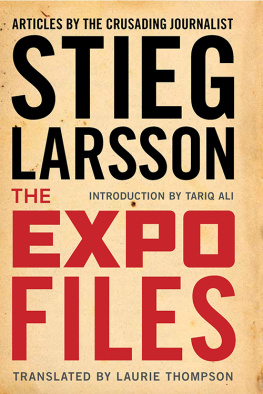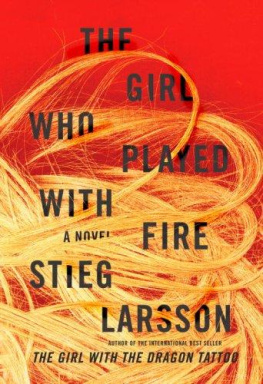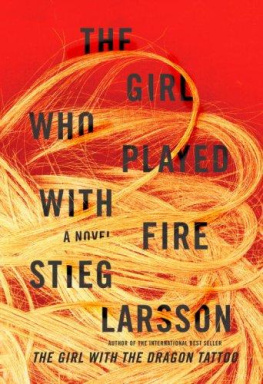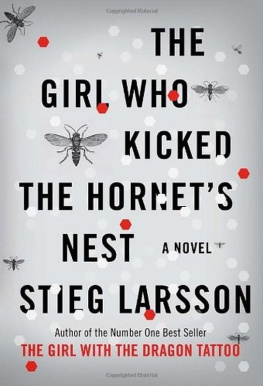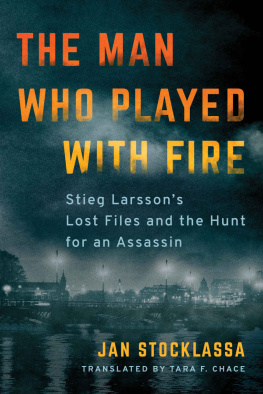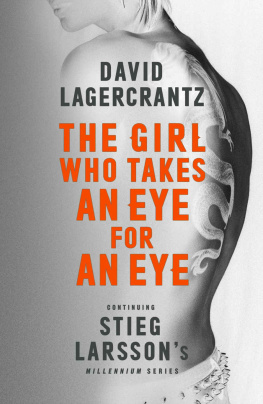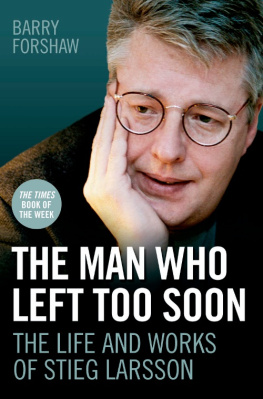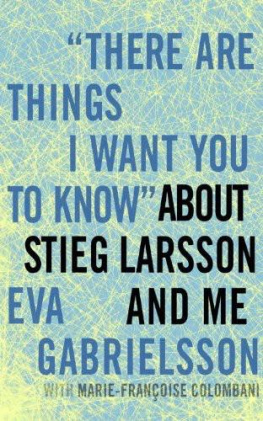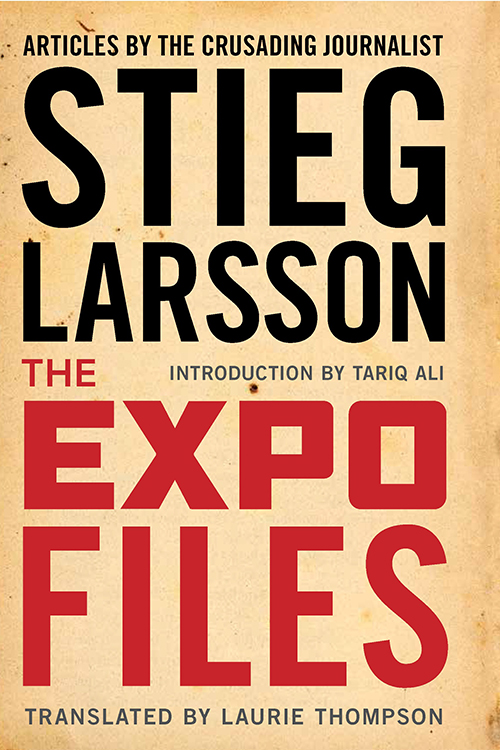
THE EXPO FILES
Also by Stieg Larsson in English translation
The Girl with the Dragon Tattoo (2008)
The Girl Who Played with Fire (2009)
The Girl Who Kicked the Hornets Nest (2009)
THE EXPO FILES
AND OTHER ARTICLES BY THE CRUSADING JOURNALIST
STIEG LARSSON
Translated from the Swedish by Laurie Thompson
Edited by Daniel Poohl
With an Introduction by Tariq Ali

MacLehose Press

MacLehose Press
An imprint of Quercus
New York London
2011 by Stieg Larsson/Expo
Published by agreement with Norstedts Agency
English translation 2012 by Laurie Thompson
Introduction 2012 by Tariq Ali
First published in Sweden as En annan sida av Stieg Larsson by Expo in 2011
First published in the United States by Quercus in 2014
All rights reserved. No part of this book may be reproduced in any form or by any electronic or mechanical means, including information storage and retrieval systems, without permission in writing from the publisher, except by reviewers, who may quote brief passages in a review. Scanning, uploading, and electronic distribution of this book or the facilitation of the same without the permission of the publisher is prohibited.
Please purchase only authorized electronic editions, and do not participate in or encourage electronic piracy of copyrighted materials. Your support of the authors rights is appreciated.
Any member of educational institutions wishing to photocopy part or all of the work for classroom use or anthology should send inquiries to Permissions c/o Quercus Publishing Inc., 31 West 57th Street, 6th Floor, New York, NY 10019, or to .
e-ISBN: 978-1-62365-065-0
Distributed in the United States and Canada by
Random House Publisher Services
c/o Random House, 1745 Broadway
New York, NY 10019
www.quercus.com
CONTENTS
2003)
2003)
2004)
2004)
2003)
2003)
2003)
2004)
2003)
2004)
2003)
2003)
Numbers in the text throughout the book refer to the explanatory notes at the end of several of the articles.
Another side of Stieg Larssona voice sadly missed
As time passes, memories of my colleague and friend Stieg begin to fade. I recall the smoke-laden atmosphere in the coffee room where we discussed the latest developments in far-right movements, and listened to Stiegs endless repertoire of anecdotes. About his National Service, his time at T.T. (Tidningarnas Telegrambyrthe Swedish Central News Agency), his trips to Africa. But I have trouble in remembering everything that was said.
But I do remember one thing perfectly clearly.
His way of writing. How he would bang his fingers down hard on the keyboard, fast and accurately, as if he were still using a typewriter.
Stieg was often stressed. A small office with so much to do. He was happy to delegate, but even so usually wanted to keep a finger in the pie. He was always adjusting the texts one last time, checking the editing one last time, correcting the reports one last time.
Yet somehow or other, he always looked relaxed as he sat there, typing away.
He often squandered hours by writing long e-mails to right-wing extremists who were eager to set debates in motion. The explanatory notes and handbooks he wrote for new members of staff were immaculately formulated, informative and comprehensive. One year he kept the editorial board entertained by circulating a series of summer updates via e-mail. He wrote polemical articles, books, pamphlets, policy documents.
And he wrote crime novels.
Stieg knew his crime novels were good. He stated quite early on, somewhat cockily, that they were going to be his pension. But nobody could possibly have dreamed they would turn out to be as successful as they have been. There is no getting away from the fact that the story of Lisbeth Salander and Mikael Blomkvist has knocked the rest of Stiegs writing into the shade.
This book is intended to remind readers of the other side of Stieg Larssons writing. To some extent it helps to explain what Stieg wanted to say in his Millennium Trilogy. It is not possible to separate the novels from his commitment to opposing racism and promoting womens rights. The book also provides information about Stieg Larsson the journalist, and the issues to which he devoted his life.
What you are about to read is far from everything that Stieg the journalist wrote. He was a contributor to various books, and for many years was a correspondent for the English journal Searchlight, besides being a contributor to other magazines.
Included here is some travel writing and several articles he wrote while working for the Swedish Central News Agency. They demonstrate that for Stieg his writing was about more than just expounding political ideas. He also wrote because he enjoyed doing so. Most of the articles are taken from the first ten years of Expo. They comprise columns, leading articles and correspondence with readers. Some of the texts selected are extracts from books that in various ways touched on subjects close to his heart. The articles are arranged thematically, and provide a guide to Stiegs views on anti-racist and feminist questions. At the same time they highlight a worrying political development.
When the journal Expo was launched in the mid-1990s, the violent neo-Nazi movement was attracting a great deal of attention in Sweden. The anti-immigration policies of New Democracy resulted in the partys resignation from the Swedish parliament, and the so-called nationalist movement made its presence felt by a series of murders and dramatic white-power concerts.
During the first ten years of the twenty-first century, the spotlight focused on the Sweden Democratsparties with roots in the murky sludge that was beginning to ooze into democratically elected institutions.
In the most recent elections, the Sweden Democrats won seats in parliament. Previously regarded as political clowns, they had now entered the corridors of power.
With hindsight it is easy to see that the driving forces behind Stiegs crime novels are also present in the rest of his writing. He had a broad basic education. He could be sarcastic and confrontational. He did not hesitate to make fun of the marginalized white-power movements peculiar way of life and conspiratorial philosophy.
I was never especially interested in Stiegs crime novels while he was writing them. Strictly in order to be polite, I once asked him how he would exploit the fame he hoped to achieve with them. The plan was well mapped out in his head. The financial security they would provide would enable him to spend all his time writing even more crime novels, polemical articles and columns.
Obviously, what I miss most is Stieg the man. His humor, his drive, his generosity. But I am also sad that he was not able to experience his success. Not for the success in itself, but for the possibilities it would have opened up for him.
He would have had a lot to say now. About the increase in Islamophobia. About the progress achieved by the Sweden Democrats. About the violence that men inflict upon women. About issues he never had the opportunity to explore while he was working on Expo.
The world has become a little quieter without Stieg around.
Next page
